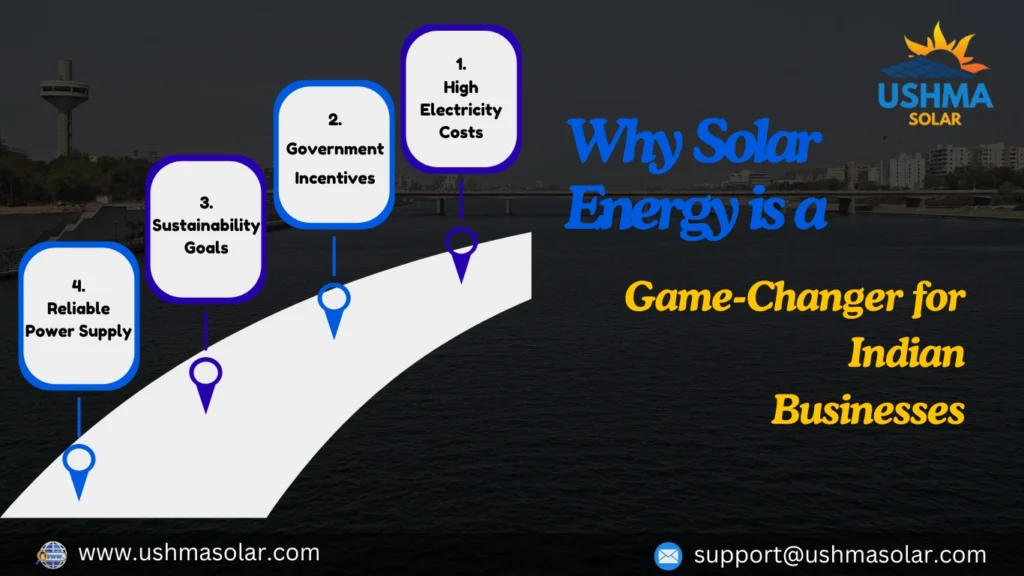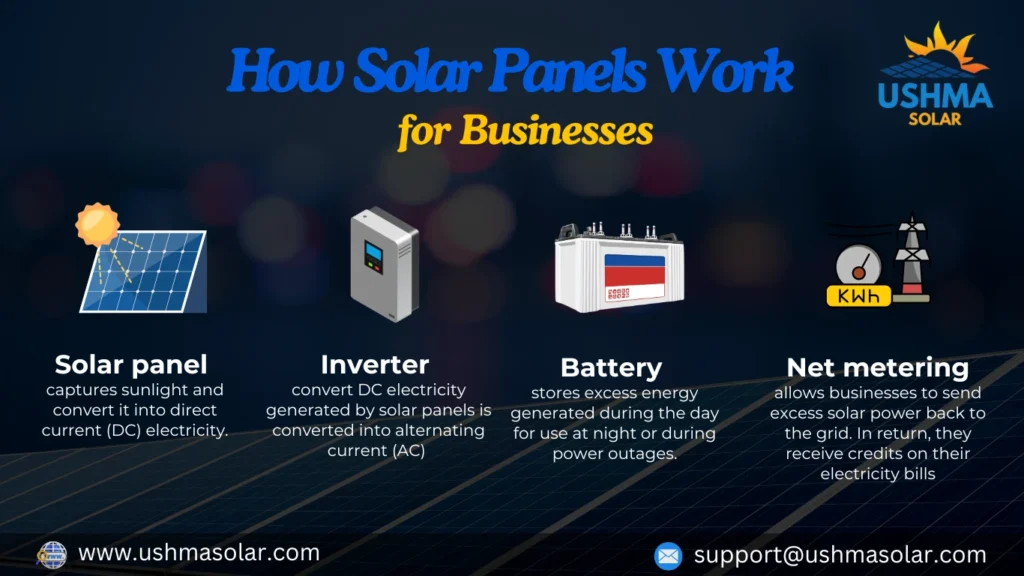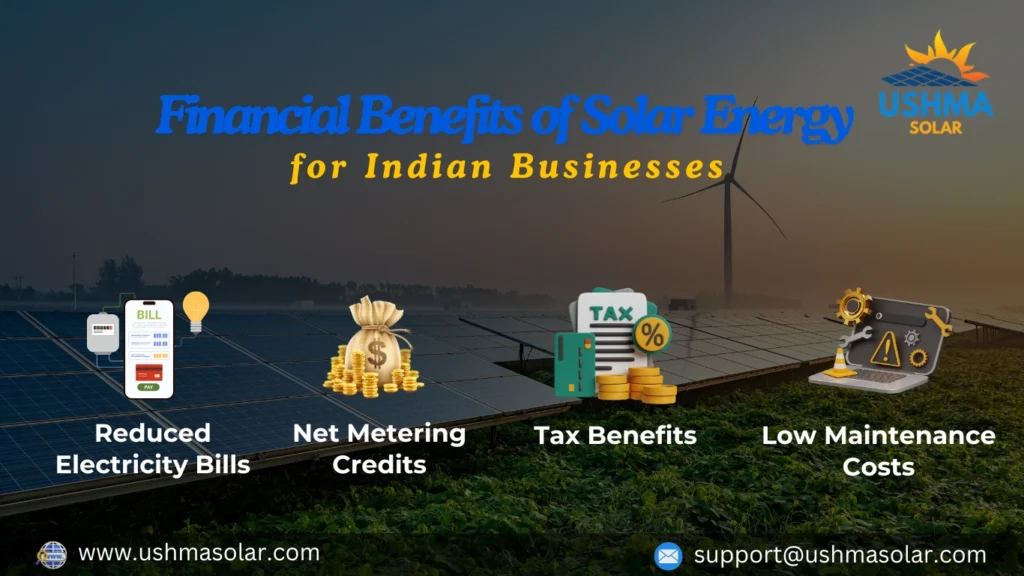
India, the vibrant commercial heart of the world, is rapidly emerging as a leader in solar energy adoption. With ample sunlight and up to 300 sunny days a year in many regions, India is primed for solar energy growth.
Businesses across various sectors like hotels, hospitals, schools, colleges, universities, malls, and cold storage facilities are increasingly turning to solar energy to reduce operational costs, ensure uninterrupted power supply, and meet sustainability goals.
Choosing the best solar company in India can help these businesses maximize savings and efficiency while leveraging renewable energy solutions.
If you’re a business owner in India, investing in a solar system is no longer just an option; it’s a necessity.
In this detailed guide, we’ll explore why partnering with a trusted solar company in India is crucial, how solar panels can benefit your business, and what to look for in a solar installation company in India.
By the end of this blog, you’ll have a clear understanding of how solar energy can transform your business operations and why now is the perfect time to make the switch.
Why Solar Energy is a Game-Changer for Indian Businesses
India’s abundant sunlight makes it one of the most promising countries for solar energy adoption. According to the National Electricity Plan 2023, India aims to achieve 50% renewable energy capacity by 2030, reinforcing its commitment to a sustainable energy future.
Some states in India have made great progress in using renewable energy, helping the country move towards cleaner power. Rajasthan is at the top with 29.98 GW of installed capacity, thanks to its large open land and plenty of sunshine.
Gujarat comes next with 29.52 GW, mainly due to its focus on solar and wind projects. Tamil Nadu follows with 23.70 GW, making good use of its strong winds. Karnataka is fourth with 22.37 GW, supported by both solar and wind energy projects.
India’s renewable energy potential is vast, with an estimated 748 GW of solar capacity and 102 GW of wind capacity identified across various regions. This ambitious expansion aligns with the nation’s goal to reduce carbon emissions and achieve energy independence.
This growth is largely driven by businesses recognizing the financial savings, energy security, and environmental benefits that solar energy offers.
This growth is driven by businesses realizing the financial and environmental benefits of solar energy.
Here’s why solar energy is a smart choice for your business:

a. High Electricity Costs
Commercial electricity tariffs in India typically range between ₹8 to ₹10 per unit, significantly impacting operational expenses for businesses.
By adopting solar energy, businesses can potentially reduce these costs by 30% to 70%, leading to substantial savings. For example, a hotel with high energy consumption could save up to ₹1 lakh per month by switching to solar power.
Note: Specific savings may vary based on location, energy consumption patterns, and initial investment costs.
b. Government Incentives
India offers various incentives to encourage businesses to adopt solar energy. These include capital subsidies, net metering benefits, and tax exemptions, making solar power a cost-effective solution for businesses across the country.
Net metering, in particular, allows businesses to export excess solar power back to the grid and earn credits on their electricity bills.
c. Sustainability Goals
With increasing pressure to adopt eco-friendly practices, businesses are turning to solar energy as part of their Corporate Social Responsibility (CSR) commitments.
Going solar not only reduces your carbon footprint but also enhances your brand’s reputation as a sustainable and responsible business.
d. Reliable Power Supply
For businesses like hospitals, cold storage facilities, and hotels, uninterrupted power supply is critical. Solar systems with battery storage ensure that your operations continue smoothly, even during power outages.
How Solar Panels Work for Businesses
Understanding how a solar system works can help you make an informed decision. Here’s a breakdown of the key components and the process:

a. Solar Panels
Solar panels are the heart of any solar system. They capture sunlight and convert it into direct current (DC) electricity. Modern solar panels are highly efficient and can generate significant power even on cloudy days.
b. Inverters
The DC electricity generated by solar panels is converted into alternating current (AC) by inverters. AC is the type of electricity used by most commercial appliances and equipment.
c. Battery Storage (Optional)
While not mandatory, battery storage is a valuable addition to any solar system. It stores excess energy generated during the day for use at night or during power outages. This is particularly useful for businesses that require a continuous power supply.
d. Net Metering
Net metering is a system that allows businesses to send excess solar power back to the grid. In return, they receive credits on their electricity bills. This not only reduces your energy costs but also ensures that no solar energy goes to waste.
The entire process is seamless, and once installed, solar systems require minimal maintenance. Regular cleaning and annual inspections are usually sufficient to keep the system running efficiently.
Financial Benefits of Solar Energy for Businesses

Investing in a solar panel system in India is not just about sustainability, it’s a financially sound decision. Here’s how solar energy can benefit your business:
a. Reduced Electricity Bills
One of the most immediate benefits of solar energy is the reduction in electricity bills. Businesses can save anywhere between 30-70% on their energy costs, depending on the size of the solar system and their energy consumption.
For example, a hotel with high energy usage can save up to ₹1 lakh per month by switching to solar.
b. Net Metering Credits
Net metering allows businesses to earn credits for the excess solar power they send back to the grid. This can significantly offset your energy costs.
In some cases, businesses with large rooftops, such as schools and universities, can even eliminate their electricity bills entirely.
c. Tax Benefits
The Indian government offers accelerated depreciation (up to 40%) on solar equipment, allowing businesses to claim tax deductions under Section 32 of the Income Tax Act. This makes solar energy an even more attractive investment.
d. Low Maintenance Costs
Solar energy systems are not only affordable to maintain but also highly efficient over the long term. With basic upkeep like occasional cleaning and inspections, solar panels can deliver reliable performance for decades.
Businesses and households typically spend just ₹5,000–₹10,000 annually on maintenance, making solar a budget-friendly energy solution.
In India, solar power has transformed lives, especially in rural areas. Small-scale solar systems have replaced traditional fuels like firewood and kerosene for cooking, lighting, and other daily needs.
This shift has brought cleaner kitchens, reducing harmful smoke and lowering the risk of lung and eye diseases. Women and girls, who once spent hours gathering firewood, now save time and effort, improving their quality of life. Solar adoption has also boosted rural economies by creating jobs in installation, maintenance, and local entrepreneurship.
The country is on track to source 50% of its electricity from non-fossil fuels by 2030, cutting carbon emissions and enhancing energy security. For industries, solar adoption has proven financially rewarding too, according to the Ministry of New and Renewable Energy (MNRE).
Sector-Specific Benefits of Solar Energy
Solar energy offers unique benefits for different sectors. Here’s how various industries in india can benefit from solar energy:
a. Hotels & Resorts
Hotels and resorts have high energy demands due to lighting, air conditioning, and other amenities. Solar energy can significantly reduce operational costs, provide reliable backup power, and enhance the hotel’s reputation as a sustainable business.
b. Hospitals & Clinics
For hospitals and clinics, uninterrupted power supply is critical. Solar systems with battery storage ensure that critical equipment remains operational, even during power outages.
Additionally, solar energy can help reduce electricity bills, allowing hospitals to allocate more resources to patient care.
c. Schools, Colleges & Universities
Educational institutions often have large rooftops, making them ideal for solar installations. Solar energy can reduce operational costs and provide a practical example of sustainability for students. Many institutions also use solar energy as part of their environmental education programs.
d. Malls & Shopping Complexes
Malls and shopping complexes have high energy demands due to lighting, air conditioning, and escalators. Solar energy can significantly reduce energy bills and make the mall more attractive to tenants and customers.
e. Cold Storage Facilities
Cold storage facilities require a continuous power supply to maintain the temperature of perishable goods. Solar systems with battery storage ensure uninterrupted power, reducing the risk of spoilage and financial losses.
Solar Panel Sizes for Commercial Use: Applications, Costs, ROI, and Payback Period
When it comes to commercial solar installations, the size of the solar system depends on the energy requirements of the business. Below is a detailed table outlining different solar panel sizes, their applications, costs, ROI, and payback periods.
| System Size (kW) | Applications | Estimated Cost (₹) | Annual Savings (₹) | ROI (%) | Payback Period (Years) |
|---|---|---|---|---|---|
| 10 kW | Small hotels, clinics, small schools, offices, restaurants, retail shops | ₹6,00,000 – ₹7,00,000 | ₹1,00,000 – ₹1,50,000 | 20-25% | 4-5 |
| 25 kW | Medium-sized hotels, hospitals, colleges, small malls, corporate offices, co-working spaces | ₹12,00,000 – ₹15,00,000 | ₹3,00,000 – ₹4,00,000 | 20-25% | 4-5 |
| 50 kW | Large hotels, hospitals, universities, medium-sized malls, warehouses, large showrooms | ₹25,00,000 – ₹30,00,000 | ₹6,00,000 – ₹8,00,000 | 20-25% | 4-5 |
| 100 kW | Large malls, cold storage facilities, factories, IT parks, industrial units, | ₹50,00,000 – ₹60,00,000 | ₹12,00,000 – ₹15,00,000 | 20-25% | 4-5 |
| 500 kW | Large commercial complexes, industrial parks, multiple facilities, manufacturing plants, large data centers | ₹1,80,00,000 – ₹2,00,00,000 | ₹60,00,000 – ₹75,00,000 | 20-25% | 4-5 |
Key Notes:
- Costs: The cost of solar systems varies depending on the quality of components, installation complexity, and additional features like battery storage.
- Annual Savings: Based on an average electricity cost of ₹8-₹10 per unit and 300 sunny days per year.
- ROI and Payback Period: Most commercial solar systems have an ROI of 20-25% and a payback period of 4-5 years, after which businesses enjoy free electricity for the system’s lifespan (25+ years).
Best Solar Company in India: Cost, Efficiency, and Top Manufacturers
India is home to several leading solar panel manufacturers that offer high-quality products at competitive prices. Below is a table comparing some of the top Indian solar panel manufacturers:
| Company Name | Panel Type | Efficiency (%) | Cost per Watt (₹) | Warranty | Key Features |
|---|---|---|---|---|---|
| Tata Power Solar | Monocrystalline | 19-21% | ₹30-₹35 | 25 years performance | One of India’s largest, High efficiency, durable, suitable for commercial and industrial applications. |
| Waaree Solar | Monocrystalline | 18-20% | ₹28-₹32 | 25 years performance | One of India’s largest, robust and reliable. |
| Adani Solar | Polycrystalline | 17-19% | ₹25-₹30 | 25 years performance | Cost-effective, ideal for large-scale commercial installations. |
| Vikram Solar | Monocrystalline | 19-21% | ₹30-₹35 | 25 years performance | High efficiency, excellent performance in low-light conditions. |
| Loom Solar | Monocrystalline | 20-22% | ₹32-₹38 | 25 years performance | Premium monocrystalline panels with high efficiency., suitable for rooftops and commercial use. |
| RenewSys | Polycrystalline | 17-19% | ₹26-₹30 | 25 years performance | Affordable and reliable, widely used in commercial projects. |
| Goldi Solar | Monocrystalline | 18-20% | ₹28-₹32 | 25 years performance | High-quality panels, suitable for both residential and commercial applications. |
Key Notes:
- Efficiency: Monocrystalline panels are generally more efficient than polycrystalline panels but come at a higher cost.
- Cost per Watt: The cost varies depending on the type of panel, efficiency, and brand.
- Warranty: Most manufacturers offer a 25-year performance warranty, ensuring long-term reliability.
Choosing the Right Solar Installation Company
Selecting the right solar company is crucial for a seamless transition to solar energy. Here’s what to look for:
a. Experience and Expertise
Choose a company with a proven track record in commercial solar installations. Experienced companies are more likely to deliver high-quality installations and provide reliable after-sales support.
b. Warranty and After-Sales Support
Look for a company that offers a minimum 25-year warranty on solar panels and comprehensive maintenance services. Good after-sales support is essential for the long-term performance of your solar system.
c. Client Portfolio
Check the company’s client portfolio for testimonials and case studies from similar businesses. This will give you an idea of their expertise and reliability.
Learn More About Commercial Solar Panel Systems: Benefits, Applications, and Functionality
FAQs
How much can my business save with solar energy?
Businesses can save 30-70% on electricity bills, depending on the size of the solar system and their energy consumption.
What is the payback period for commercial solar systems?
The average payback period is 3-5 years, after which businesses enjoy free electricity for the system’s lifespan.
How long does it take to install a solar system?
Most commercial solar systems take 4-8 weeks to install, depending on the system size and site conditions.
What maintenance is required for solar panels?
Regular cleaning and annual inspections are recommended to maintain efficiency.
Conclusion
Switching to solar energy is a strategic move for businesses in India. With a wide range of solar panel sizes and options available, you can choose a system that meets your energy needs and budget.
Whether you run a small hotel, a large hospital, or a cold storage facility, solar energy can significantly reduce your electricity bills, enhance your sustainability efforts, and provide a reliable power supply.
By partnering with a trusted solar company and selecting high-quality panels from reputable Indian manufacturers, you can ensure a seamless transition to solar energy.
With an average payback period of 4-5 years and an ROI of 20-25%, solar energy is not just an eco-friendly choice—it’s a financially sound investment for the future.
Sources:
- Ministry of New and Renewable Energy (MNRE)
- Tata Power Solar
- Waaree Solar
- Adani Solar
- Vikram Solar
- Loom Solar
- RenewSys
- Goldi Solar
